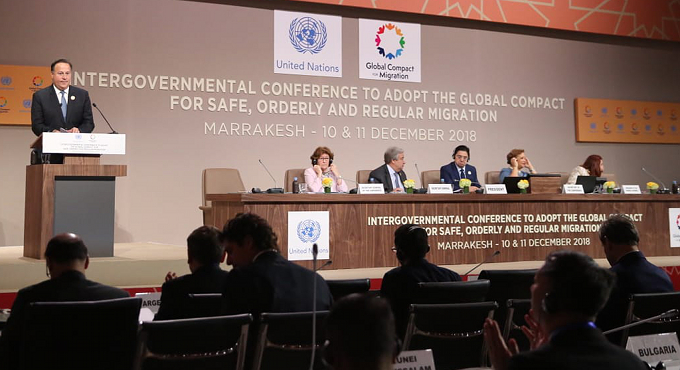
Panama joins with more than 160 countries in the global commitment to a comprehensive approach to migration
by the Presidencia
Before more than 160 countries, the President of the Republic, Juan Carlos Varela, was invited to open the General Debate of the Intergovernmental Conference to Adopt the Global Compact for Safe, Orderly and Regular Migration, where he reaffirmed the commitment of Panama to an integral approach to the global challenges of the present, one of them being migration.
Together with more than 260 countries and 20 heads of State present at the conference, such as the Chancellor of Germany, Angela Merkel; the president of Spain, Pedro Sánchez; the Prime Minister of Portugal; Antonio Costa and the Secretary of State of the Holy See, Pietro Parolin; among others, the Panamanian President shared the experiences, proposals and position of Panama in this issue.
“Panama is a small country in territory, but with great responsibilities. The vocation of Panama and its natural mandate, due to its geographical location, its Canal, its ports and its airport, is to play a global role on the front line facing the global challenges of today, for which reason it must always participate in the debate by contributing to the challenges and opportunities that human connectivity presents,” said President Varela.
President Varela emphasized the need to address migratory flows in all their dimensions with greater cooperation among countries and a common approach because it is a problem that concerns all countries.
“The only way to guarantee that migratory flows are orderly and safe for all it is to share security information, intelligence and migratory alerts among all countries. This information would prevent the entry into our countries of those who represent a risk for the security of States”, said the Panamanian President.
Referring to the Global Compact for Safe, Orderly and Regular Migration, adopted today in Marrakech, the President said that Panama responsibly — because it is historically a transit country — played an important role in the construction of this instrument, by promoting in different spheres the adoption of joint responses to address the global phenomenon of migration.
Before the plenary, President Varela called for the importance of continuing to work together to achieve the Sustainable Development Goals, under the premise that the migratory crises of which “we are witnesses in our region and in the world, are caused by the inequality, wars and violence and that therefore can only be resolved by eliminating the causes that force the citizens to leave their countries, risking their safety and that of their families.”
“That is why we are here today: to be globally responsible, share our experiences and perspectives and adopt the Global Compact for Safe, Orderly and Regular Migration, a document that opens a necessary multilateral dialogue on how to face the challenges associated with migration, respecting the sovereignty of the countries.” President Varela concluded.
Audience with the Secretary General of the UN, António Guterres
Later, President Varela held an audience with the Secretary General of the United Nations Organization, António Guterres, where he depened in the concrete actions implemented by Panama in the responsible, safe and orderly handling of recent migratory flows, such as the operation Controlled flow that has allowed the management of migratory crises of Haitian and Cuban citizens in the past, as well as the current flow of extra-continental migrants, always guaranteeing the humane treatment of the migrant.
For his part, the Secretary General of the UN thanked Panama for its commitment to address migration, reflected in the responsible participation in the construction and adoption of the Global Compact and used the meeting to send his congratulations to the country for the recent opening of the Regional Logistics Center of Humanitarian Assistance (CLRAH).
On the Global Migration Pact adopted by majority of the member countries of the UN:
- The Global Compact creates the integral framework of non-mandatory measures to make migration safer and more dignified for all.
- The document adopted by the countries is not legally binding and respects the sovereignty of States to manage their borders and their migration policies.
- The document recognizes that to mitigate the risks and challenges of migration, it is necessary to improve the cooperation among countries.
- The Pact reflects the common understanding of the Governments that migration that crosses borders is an international phenomenon, and that in order to effectively manage this global reality, cooperation is necessary to expand the positive impact for all.
- The pact does not encourage migration, does not dictate, does not impose and totally respects the sovereignty of States. It provides a new platform for cooperation and is a resource for finding a balance between the rights of individuals and the sovereignty of the States.
~ ~ ~
These announcements are interactive. Click on them for more information.












